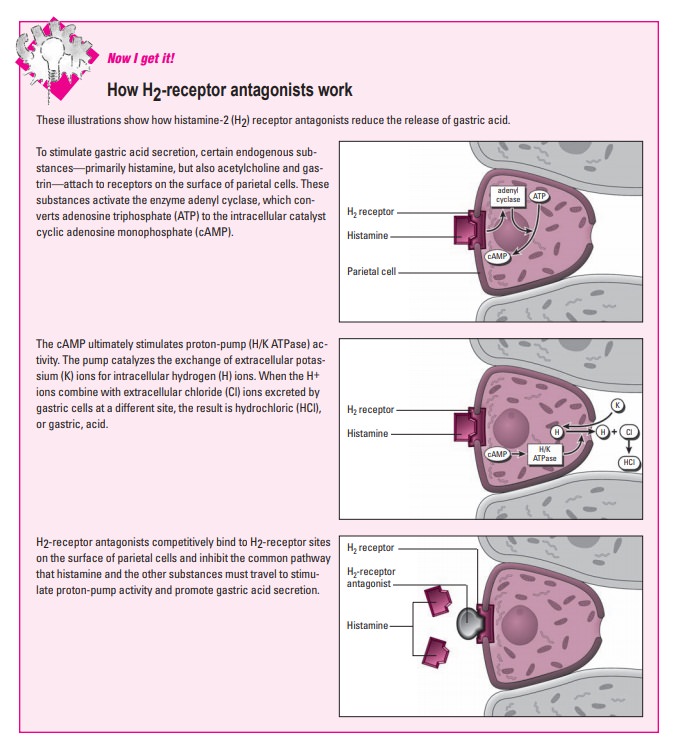Chapter: Clinical Pharmacology: Gastrointestinal drugs
H2-receptor antagonists
H2-receptor antagonists
H2-receptor antagonists are commonly prescribed antiulcer drugsin the United States. They include:
·
cimetidine
·
famotidine
·
nizatidine
·
ranitidine.
Pharmacokinetics
Cimetidine, nizatidine, and ranitidine are absorbed
rapidly and completely from the GI tract. Famotidine isn’t completely
ab-sorbed. Antacids may reduce the absorption of H2-receptor antag-onists.
Distribution, metabolism, and excretion
H2-receptor antagonists are distributed widely throughout the
body, metabolized by the liver, and excreted primarily in urine.
Pharmacodynamics
H2-receptor antagonists block histamine from stimulating the
acid-secreting parietal cells of the stomach.
The acid test
Acid secretion in the stomach depends on the binding of gastrin,
acetylcholine, and histamine to receptors on the parietal cells. If the binding
of one of these substances is blocked, acid secretion is reduced. The H2-receptor
antagonists, by binding with H2 recep-tors, block the action of
histamine in the stomach and reduce acid secretion. (See How H2-receptor antagonists work)
Pharmacotherapeutics
H2-receptor antagonists are used therapeutically to:
§
promote healing of
duodenal and gastric ulcers
§
provide long-term
treatment of pathologic GI hypersecretory conditions such as Zollinger-Ellison
syndrome
§ reduce gastric acid production and prevent stress ulcers in the severely
ill patient and in the patient with reflux esophagitis or up-per GI bleeding.
Drug interactions
H2-receptor antagonists may interact with antacids and other
drugs.
§
Antacids reduce the
absorption of cimetidine, famotidine, nizati-dine, and ranitidine.
§
Cimetidine may increase
the blood levels of oral anticoagulants, propranolol (and possibly other
beta-adrenergic blockers), benzo-diazepines, tricyclic antidepressants,
theophylline, procainamide, quinidine, lidocaine, phenytoin, calcium channel
blockers, cyclo-sporine, carbamazepine, and opioid analgesics by reducing their
metabolism in the liver and subsequent excretion.
§
Cimetidine taken with
carmustine increases the risk of bone marrow toxicity.
§
Cimetidine inhibits
metabolism of ethyl alcohol in the stomach, resulting in higher blood alcohol
levels. (See Adverse reactions toH2-receptor
antagonists.)

Related Topics